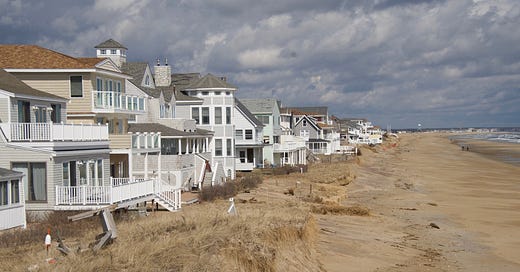Notes from an Environmentalist; CNN "$500,000 worth of sand washes away in 72 hours!" The Salisbury Conundrum.
Houses still stand after sacrificial sand was washed away.
The Salisbury Conundrum
On March 17, 2024 I visited Salisbury, Massachusetts. Its citizens had just been humiliated on national television for paying $500,000 to put sand on the beach only to have I wash away in 72 hours. It was presented as a ridiculous folly by a bunch of climate deniers.
But what struck me was how successful that sand had actually been, not a single house had been severely damaged or washed away. Each homeowner had put up $5,000, about as much as insurance or a condo fee, to protect their homes. And it had worked, all except for the optics, which were quite horrible.
But that sacrificial sand may get most of the homes through this erosion season. They only have to get through one last window of new moon high tides in April. But each person will have to decide whether they want to put up another $5,000 to $15000 to protect their homes for the next erosion season.
One of the points the CNN journalist made was that state officials predict we will have a foot of sea level rise by the mid-2030’s.
But, sea level rise is the least important component of coastal erosion. The most important component is the power of a storm and the height of the tides when the storm makes landfall.
So a hurricane that rushes through at low tide in June wont cause nearly as much erosion as a Nor’easter that lingers offshore through several winter tidal cycles.
The bad news is that the tides are on a 30-year cycle. So while Salisbury just had an almost 10 foot high tide during the March storm, by the mid-30’s, they will have to contend with tides three to almost four feet higher.
But after that mid-30’s peak the tides will recede again for the next 15 years.
So what Salisbury homeowners have to decide is whether they want to continue paying $5,000 to $15,000 a year to protect their homes or to throw up their hands and say, “I have had 60 wonderful years in this home but now is the time to let go.”
What the state of Massachusetts has to decide is whether to it wants to protect Route 1a and its beachfront homes or decide whether to withdraw.
What we as a nation have to decide is whether it makes sense to keep developing barrier beaches in the face climate change and sea level rise.





Very informative Bill! Thank you for setting the record straight on this story.